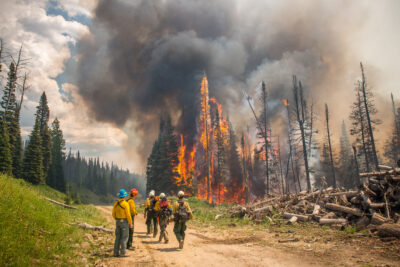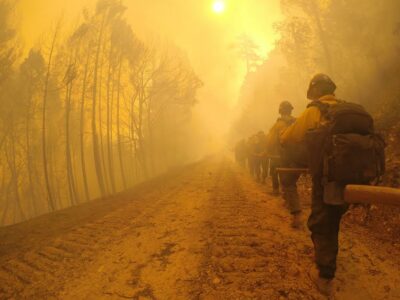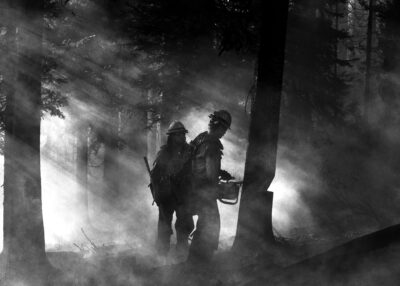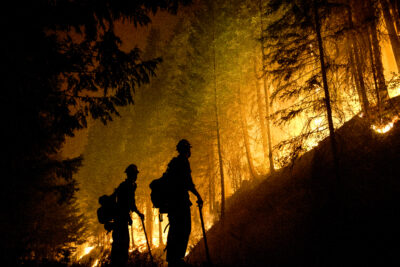Yes. We do not require you to share your personal information in order to provide help and support. In certain situations, we may need to verify your employment as a Wildland Firefighter or Wildland First Responder and if you are referred to a therapist, they will need your personal information and will maintain confidentiality in compliance with HIPPA regulations.
We maintain strict confidentiality and your information as well as communication with us will be confidential. We do not share your private information unless you specifically ask us to.
Mental health refers to a person’s overall psychological well-being. It encompasses a range of factors, including emotional, social, and cognitive well-being. Mental health affects how individuals think, feel, and behave. It also impacts their ability to cope with stress, form relationships, and make decisions.
Good mental health can manifest in different ways for different people, but generally, it involves being able to cope with the challenges of life, feeling a sense of purpose and fulfillment, maintaining healthy relationships, and experiencing positive emotions. Some signs of good mental health may include:
- A positive outlook: Someone with good mental health tends to have a positive outlook on life, seeing opportunities rather than obstacles, and having a sense of optimism about the future.
- Emotional Balance: They are able to manage their emotions in a healthy way, experiencing a range of emotions but not becoming overwhelmed by them.
- Resilience: They can bounce back from setbacks and adapt to change using their coping skills to manage stressors and challenges.
- Self-awareness: They have a good understanding of their own thoughts, feelings, and behaviors, and are able to identify when they need support or help.
- Healthy relationships: They are able to form and maintain healthy relationships, communicating effectively and setting boundaries when needed.
- Engagement with the world: They are involved in meaningful activities, pursuing interests and goals that give them a sense of purpose and fulfillment.
Overall, good mental health involves being able to manage the ups and downs of life in a healthy way, while also maintaining a positive sense of self and connection to others.
There are many signs and symptoms that may indicate deteriorating mental health. Here are some common ones:
- Persistent feelings of sadness, hopelessness, or helplessness.
Significant changes in appetite, weight, or sleep patterns.
- Loss of interest in activities or hobbies, that were once enjoyable.
- Difficulty concentrating, making decisions, or remembering things.
- Fatigue or lack of energy.
- Irritability, anger or restlessness.
- Withdrawal from social situations.
- Feelings of worthlessness or guilt.
- Increased alcohol or drug use.
- Suicidal thoughts or behaviors.
It’s important to note that everyone experiences mental health challenges differently, and not everyone will exhibit all of these symptoms. It’s also true that a person can have these experiences and not be struggling with mental health, however if the symptoms persist or get more intense this could be a sign that help is needed.
Additionally, some of these symptoms may be a result of other underlying medical or psychological conditions, so it’s important to consult with a mental health professional for a proper diagnosis and treatment plan.
If you are struggling with your mental health, it is important to seek help. A trusted family member or friend can be a great place to start. For others, this may involve talking to a mental health professional, such as a therapist or psychiatrist, or reaching out to a support group or hotline. Your primary care physician can also provide a referral to a mental health specialist.
The Wildland Firefighter Foundation can assist with finding a counselor or therapist and other similar resources. We also offer financial resources for Wildland Firefighters and their families. We are here assist you or someone you know in getting the needed help. Please contact us.
We are here for you.
Yes, it is normal to experience a range of emotions, including anxiety and sadness. However, if these feelings persist and begin to interfere with your daily life, it may be a sign that you need professional help.
Some common mental health disorders include depression, anxiety, attachment disorder, bipolar disorder, schizophrenia, and personality disorders. Each disorder has unique symptoms and requires specific treatment.
Not everyone who struggles with mental health has a Mental Health Disorder. Everyone has a bad day occasionally or feels sad or out of sorts sometimes. It’s important to speak to someone you trust about your personal situation because everyone is different with different perceptions, experiences and understanding. It’s not a comparison and never a one size fits all approach.
There are many things you can do to improve your mental health, including practicing self-care, such as getting enough sleep, eating a balanced diet, and staying physically active. You can also seek support from friends and family, engage in mindfulness practices, such as meditation or deep breathing, and talk to a personal development coach, counselor, mental health professional about treatment options.
Some common misconceptions about mental health include the belief that mental health issues are a sign of weakness, that they can be easily overcome with willpower alone, or that they are a result of personal failings.
Due to the stressful environment Wildland Firefighters regularly face, the belief is that a person should be able to cope with the stress and handle it on their own. These beliefs can stigmatize mental health issues and prevent individuals from seeking the help they need.
Suicidal thoughts are thoughts or feelings about ending one’s life or taking one’s own life. These thoughts can range from fleeting and occasional to persistent and overwhelming.
Some common signs that you may be experiencing suicidal thoughts include:
- Feeling hopeless or trapped: You may feel like there’s no way out of your current situation, or that things will never get better.
- Increased substance use: Turning to drugs or alcohol to numb your pain or help you cope.
- Talking about death or suicide: You may make comments about feeling like you’re better off dead, or that others would be better off without you.
- Changes in behavior or mood: You may withdraw from friends and family, experience mood swings including irritability, anger or shut down, or have trouble sleeping.
- Making plans: You may begin to make plans for how you would end your life, such as gathering materials or writing a note.
If you’re experiencing suicidal thoughts, it’s important to seek help immediately. This can include reaching out to a mental health professional, contacting a Crisis Hotline (CALL OR TEXT 988), or speaking with a trusted friend or family member.
Remember, there is help available and you do not have to go through this alone.
Talking to someone who is struggling with their mental health can be challenging, but there are some things you can do to help. Here are a few tips:
- Listen without judgment: Let the person know that you are there to listen and that you care about them. Allow them to express their feelings without interrupting or judging them.
- Validate their feelings: Let the person know that their feelings are valid and that it’s okay to feel the way they do. Avoid telling them that they shouldn’t feel a certain way.
- Be patient: It’s important to be patient with someone who is struggling with their mental health. It may take time for them to open up or feel comfortable talking about their feelings.
- Offer support: Let the person know that you are there to support them and that they are not alone. Offer to help them find resources such as a therapist or support group.
- Avoid giving advice: While it may be tempting to offer advice, it’s important to remember that you are not a mental health professional. Instead, encourage the person to seek professional help.
- Take care of yourself: Supporting someone who is struggling with their mental health can be emotionally taxing. Make sure you take care of yourself and seek support if needed.
Remember, everyone’s experience with mental health is unique, so it’s important to approach each conversation with empathy and an open mind.
**Foremost if you are present with them, stay with them until you can get in contact with a mental health professional. You can CALL or TEXT 988 for immediate support in a crisis, and/or contact the authorities by dialing 911. Be sure to let dispatch know it is a mental health crisis.
If someone you care about is expressing suicidal thoughts, it’s important to take their words seriously and respond with compassion and understanding. Here are some things you can say to help support them:
- Let them know that you care: Start by expressing your concern and letting them know that you care about them. Say something like “I’m sorry to hear that you’re feeling this way. I care about you and want to help.”
- Listen without judgment: Allow the person to express their feelings without judgment. Don’t dismiss or minimize their emotions. Just listen and try to understand what they’re going through.
- Encourage them to seek help: Let them know that there are resources available to help them. Encourage them to seek professional help, such as a therapist or counselor, and offer to help them find someone if needed.
- Offer support: Let them know that they’re not alone and that you’re there to support them. Offer to accompany them to appointments or to be there for them whenever they need someone to talk to.
- Take action if necessary: If the person is in immediate danger, don’t hesitate to call emergency services or take them to the nearest emergency room.
Remember, suicidal thoughts are a serious matter, and it’s essential to take action to help someone who is struggling.
Encourage them to seek professional help, offer your support, and be there for them during this difficult time.
If someone you know is threatening suicide with a firearm, it is important to take immediate action to ensure their safety. Here are some steps you can take:
- Call 911 or your local emergency services immediately. Inform the dispatcher of the situation, that they are experiencing a mental health crisis and are threatening suicide with a firearm and the location of the person in distress. Try to stay calm and give specific details.
- Stay with the person if it is safe to do so, but do not try to physically restrain them if they are holding a firearm.
- Try to keep the person calm and listen to them without judgment. Let them know that you care about them and that they are not alone.
- If the person is willing, ask them to hand over the firearm to you or another trusted individual until they are in a safer state of mind.
- If the person is not willing to give up the firearm and you believe they are an immediate danger to themselves or others, inform the emergency services of this information.
- If possible, contact a mental health professional or crisis hotline for guidance and support.
Remember that suicide is a serious and complex issue, and it is important to take any threats seriously. Encourage the person to seek professional help and support them in any way you can.
- Wildland Firefighter Foundation
The Wildland Firefighter Foundation provides support to families of firefighters who have died in the line of duty and to injured firefighters and their families. They also provide information and resources related to mental health and well-being for wildland firefighters.
- Federal EAP program for Wildland Firefighters
The Federal Employee Assistance Program (EAP) provides free, confidential counseling services to federal employees, including wildland firefighters. The EAP can help with a range of issues, including stress, anxiety, depression, and substance abuse.
To learn more about the program, visit their website: https://www.opm.gov/policy-data-oversight/worklife/employee-assistance-programs/federal-employee-assistance-programs/.
- SAMHSA
The Substance Abuse and Mental Health Services Administration (SAMHSA) is a government agency that provides information and resources related to mental health and substance abuse. They offer a national helpline, treatment locator, and educational resources.
To learn more, visit their website: https://www.samhsa.gov/.
- Psychology Today
Psychology Today is a website that provides a directory of mental health professionals in various geographical areas. The website allows individuals to search for therapists by location, specialty, and other criteria.
To learn more, visit their website: https://www.psychologytoday.com/us.
- National Alliance on Mental Illness (NAMI)
NAMI is a nonprofit organization that provides education, support, and advocacy for individuals and families affected by mental illness. They offer resources such as support groups, educational programs, and a helpline.
To learn more, visit their website: https://www.nami.org/.




